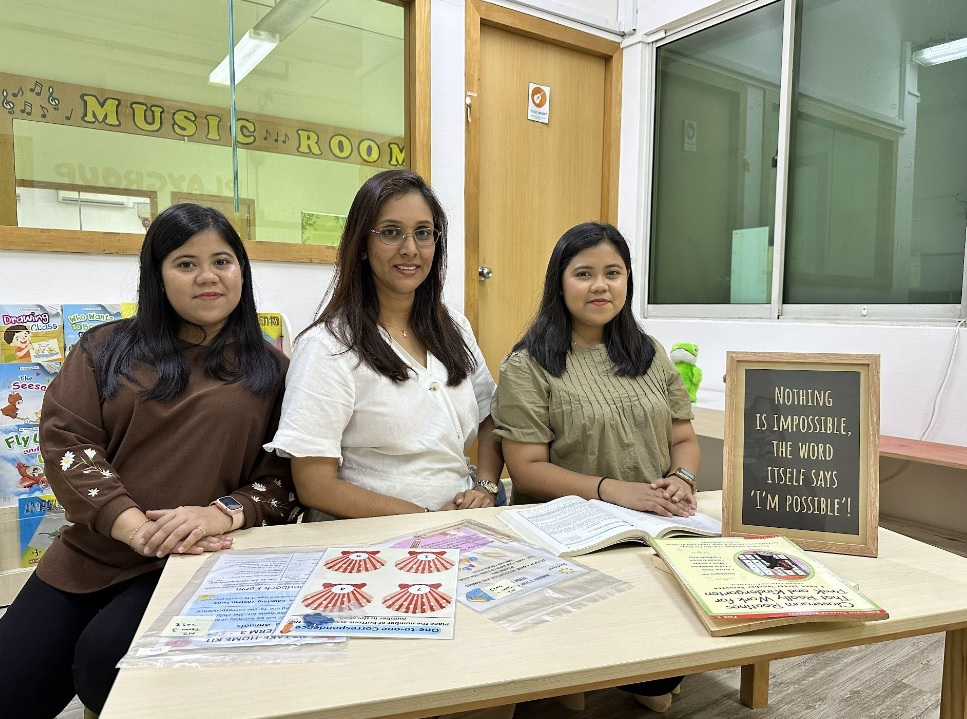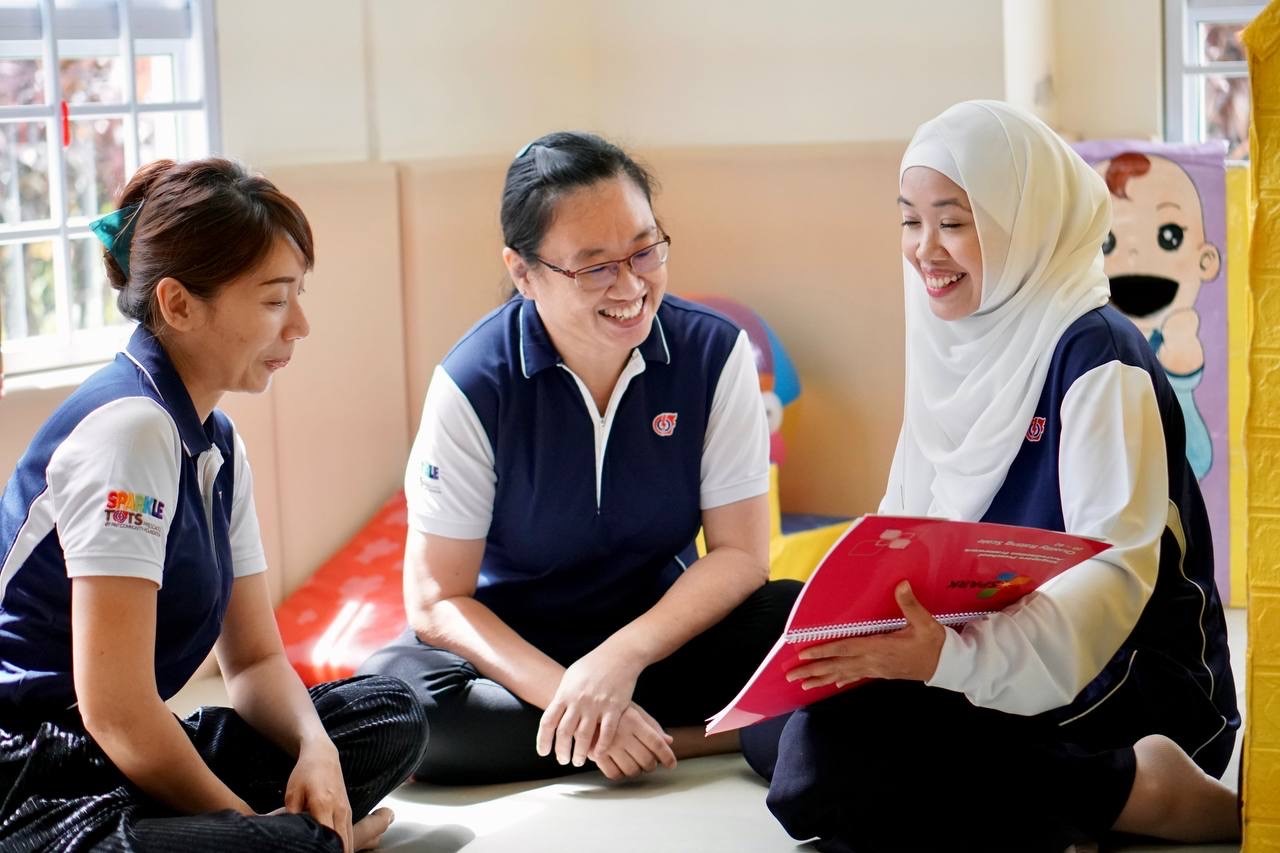Learning about Sustainability From Our Gardens
Learning Vision @ NTU
The classroom is not the only place where learning can take place. Outdoor spaces offer the best natural environment for children to enjoy learning and stay healthy too. With a little help from a community partner, the children from Learning Vision @NTU learnt about environment sustainability through integrated indoor and outdoor learning experiences!
EXPANDING CHILDREN'S LEARNING THROUGH COMMUNITY PARTNERSHIPS
Learning Vision @NTU’s herb garden project took root from the centre’s participation in Start Small Dream Big (SSDB). SSDB is a sector-wide initiative by the Early Childhood Development Agency (ECDA) that aims to encourage preschools to create authentic platforms for children to give back to the community.

Let’s Start Small Dream Big!
“We hoped that our children can give back to the community creatively through growing their own herb gardens, volunteerism, and fundraising,” said Ms Rockyen, Principal of Learning Vision @NTU.
Aside from community giving, the early childhood educators from Learning Vision @NTU also wanted their children to understand the importance of environmental sustainability and nurture an appreciation for nature. The educators also saw this project as an opportunity to involve parents in their children’s learning.
At the launch of Learning Vision @NTU’s herb garden project, the children gave a brief introduction of their project and sang John Denver’s ‘The Garden Song’. They even made pledge cards with their parents as a reflection of their commitment to give back to the community. Parents were invited to attend the launch event. Those who were unable to attend could view their children’s efforts through Facebook Live.
To conceptualise the SSDB project for the children, the centre decided to collaborate with NParks. One of the NParks managers came to the centre to share with the educators his knowledge about plants and how Nparks could help them implement their project. He also helped assess if the children could set up a herb garden on the preschool premises. He even arranged a hands-on workshop for the children so that they could learn to design and create their own terrariums and dish-plants for the fundraising carnival.

Learning how to create our own terrariums and dish-gardens!

Our creations from the workshop!
A LEARNING JOURNEY TO HORT PARK
With the assistance from NParks, the early childhood educators brought the children on a learning journey to HortPark. The children were taken on a facilitated tour through the Junior Potter’s Garden Adventure. Using plants found in the garden, the facilitator introduced the children to the life cycle of plants, different plant parts and their uses. The children also used their five senses to explore the different types of flowers and leaves that they encountered. This gave them an appreciation of the diversity of flora and fauna found in HortPark.

Learning journey to HortPark
At the end of the tour, the children had the opportunity to plant the seeds in mini pots of soil. The facilitators shared with them tips on how to ensure that the seeds would successfully germinate and grow into healthy plants. These mini plants were then brought back to the classroom for the children to start their own herb garden. The children could then learn valuable lessons simply from taking care of the plants that they brought back.

Learning how to pot our seeds and take care of plants!

Setting up our herb garden at Learning Vision @NTU
“The project has been an opportunity for us to share with David the virtue of patience, and the value of reaping what you sow,” said Mr and Mrs Koh, parents of David, K2. They added: “As he watered and took care of his plant daily, his actions and observations help reinforce these moral lessons for him. Even for us as parents, it was a joy to see his plant growing in front of his classroom when we sent him to school daily.”

David with his parents, Mr and Mrs Koh and younger brother
SPREADING LOVE WITH A CREATIVE GARDEN
Aligned with their commitment to give back to the community, Learning Vision @NTU organised a fundraising carnival to raise funds for Club Rainbow (Singapore), a charity organisation supporting children with chronic illnesses and their families.

Welcome to our fundraising carnival!
To raise funds for charity, the K1 and K2 children built terrariums and dish gardens under the guidance of NParks officers. Through building their own terrarium and dish garden, the children got to explore the use of different materials, learn how to take care of succulents and enjoy the creative process of decorating their individual gardens. They also learnt about the benefit of plants in creating a healthy and vibrant indoor space.
The parents of Adryan Bin Muhammed Farizal from K2 were overjoyed at their son’s newfound enthusiasm for gardening. His mother, Ms Roszalina Rawi, said: “Adryan’s favourite part was building his own terrarium. He learnt so much about what plants need in order to thrive. He woke up excitedly that morning, armed with little toys that he wanted to use to decorate his terrarium.”

Having tons of fun creating terrariums and dish-gardens for charity!
The younger children contributed nature-inspired crafts created from twigs, dried leaves, seeds and dried flowers. These unique pieces of artwork were also sold to raise funds for charity.
Together, the children did such a great job of selling their crafts that the amount collected exceeded the previous year’s charity sales. However, it was the confidence and camaraderie among the children that was most heartening. The support and enthusiasm exuded by the parents during the fundraising carnival also helped spur the children on.
 |  |  |
LESSONS FROM AN HERB GARDEN
Ms Rockyen, Principal of Learning Vision @ NTU noted the children’s growing appreciation for nature as the project progressed. They became aware that having more plants in the environment helped to ensure cleaner air. Ms Rockyen was delighted that the herb garden project also helped spark conversations among the children about the importance of sustainability. On their own initiative, the children discussed how to save the trees, such as reducing and reusing papers, during free drawing time.
“The children also became more aware of the importance of energy conservation,” said Ms Rockyen. She added: “They would remind their friends to turn off the tap after use, or avoid letting the water run while brushing their teeth. They would also remind their teachers to switch off the lights whenever they go out for their outdoor activities.”
The project also actively engaged parents and got them involved in their children’s learning journey. Ms Roszalina was pleased that her young son, Adryan, was able to play a part in nature conservation through this project. She observed how he learnt to conserve energy at home through simple actions such as switching off the fan and lights when there was no one in the room. More importantly, the project actually inspired Adryan to start reading up on plants and animals on his own.
IMPORTANCE OF OUTDOOR LEARNING EXPERIENCES
As an early childhood professional, Ms Rockyen believes that outdoor learning enables children to learn and absorb knowledge in a real-world context. The outdoors also provides children with opportunities for critical thinking and reflection. However, planning outdoor learning activities for children does come with its challenges.
“Educators will need to plan hands-on activities that integrate the natural surroundings to stimulate the children in creative thinking and learning,” said Ms Rockyen. She added: “We also need to manage parents’ concerns about insect bites and outdoor risks. To reassure parents and minimize incidents, we always establish rules with the children before embarking on any outdoor activities. I also ensure that we have sufficient manpower to accompany the children outdoors. We will also advise parents to prepare insect repellent for the children as a prevention against insect bites.”
Ms Rockyen was most heartened to learn that the children’s outdoor learning experience at HortPark was well-received by parents. One of the parents even planned a family trip to HortPark after the project so that her family could appreciate the greenery and beautiful flowers there.

Adryan with mummy, Ms Roszalina, at HortPark
Shared Mr and Mrs Koh: “We are highly supportive of such outdoor learning opportunities as they extend the child’s horizon and helps him/her to gain a wider knowledge of the world around him/her. It is very reassuring that in this concrete jungle that we live in, our children get a chance to interact with and enjoy nature.”
Ms Roszalina echoed Mr and Mrs Koh’s words: “[As a parent,] I think outdoor learning is paramount to a child’s learning experience. I strongly believe there should be more outdoor playtime because kids learn best when they are at play and there is so much to learn from Mother Nature. Other than trips to forested areas, parks, ponds, designated outdoor spaces in schools are crucial for a child’s holistic development.”
All photographs were contributed by Learning Vision @NTU.
.jpg?sfvrsn=333c1339_1)






